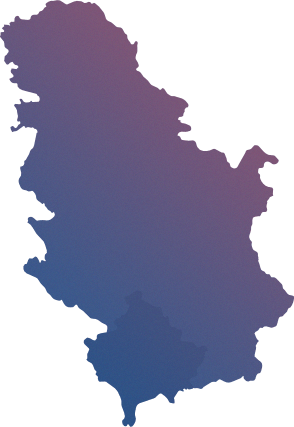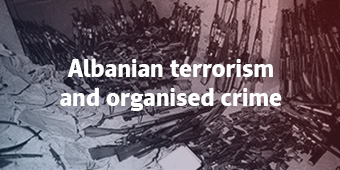
Films on Kosovo and Metohija by Ninoslav Randjelovic

Where the fields are ... Kosovo-Metohija 2006 - 2007 (24 minutes)
This film presents several cases of violation of human rights and freedom of non-Albanian population in Kosovo-Metohija. The film contains interviews with representatives of international institutions and local authorities in Kosovo-Metohija, as well as the persecuted non-Albanian population in the province.
Document of Suffering: Kosovo-Metohija 1998 - 2007 (25 minutes)
A record of nine years of suffering and agony faced by Serbs and other non-Albanians in Kosovo-Metohija, this film acts as an authentic witness to the failure of the international community to protect the basic human rights of Serbs and non-Albanians.
Internally displaced (18 minutes)
Since mid-1999 over 230.000 Serbs and other non-Albanians were driven out from Kosovo and Metohia despite the presence of the international military (KFOR) and police force (UNMIK) in the region.
Most of them have been accommodated in Serbia proper, either in collective centers or in some form of private arrangement.
Their basic survival has often solely depended on humanitarian programs of the international community.
However, with the political changes and greater social stability in the region, came also a gradual reduction in the scope of humanitarian activities. The largest humanitarian organizations have closed down their programs, so finding solutions to hardships that internally displaced people face daily has been one of the biggest challenges for a government of Serbia.
The Glory of High Decani (20 minutes)
The monastic community of the ancient Serbian Monastery High Decani is one of the last spiritual centers of Orthodox faith in Kosovo today.
During recent years of ethnic conflicts and in the midst of destruction and terror – Monastery High Decani has been a steadfast and safe haven for anyone in dire need, regardless of their ethnicity or religious beliefs.
Behind the barbed wires, protected by the KFOR troops and rarely visited by civilian population, this monastic community, nevertheless, lives rich and peaceful life, spreading a "good news", the news ever so important for our troubled time: that the true spiritual life and the ultimate diplomacy is "diplomacy of the heart". It is given in our ability to forgive, to show compassion, and to love one another.
Metohija, June 2005 (4 minutes)
The first service in the Saint Petar Koriski monastery since 1998 was held on June 17, 2005.
A small group of Serbs visited this Orthodox sacred site dating from the 13th century, located on the slopes of Sar mountain in Metohija. The remains of the Saint Petar Koriski are being kept at the Crna Reka monastery.
During a trip through Metohija, this small group of visitors saw demolished Orthodox churches near Djakovica which are not being reconstructed.
Notes about the Rock (24 minutes)
A unique archive of destroyed Orthodox churches, monasteries and sacred sites in Kosovo-Metohija in the period between 1998 and 2005. Many of these video recordings are the only video document currently available to the media.
Cave Volujak (4 minutes)
In mid-April, UNMIK representatives found remains of 21 bodies of Kosovo Serbs in a cave near the village of Volujak near Klina. The victims were reported missing in the summer of 1998. This video material includes updated materials of Gracanica’s Glas Juga journalists as well as materials from the archives of Ninoslav Randjelovic, who recorded talks with the families of the missing Kosovo Serbs from that area, which is today a firm strongpoint of the Kosovo Liberation Army (KLA).
Kosovo-Metohija, 1998 - 2003 (17 minutes)
A documentary overview of six years of suffering of the Serb and non-Albanian people in Kosovo-Metohija. This film is at the same time an authentic testimony on the failure of the international community to protect and secure fundamental human rights for Serbs and other non-Albanians in the province.
Days Made of Fear (20 minutes)
Regardless of the fact that the Kosovo parliament and local authorities were appointed, the security situation in Kosovo-Metohija and the living conditions of Serb and non-Albanian populations worsened during 2003. Numerous terrorist attacks, murders of teachers and children, frequent attempts of kidnappings and frightening were recorded in the movie, pointing to the crucial failures of the international forces of army and police in tackling organised terrorist activities in the region so far, as well as meeting basic goals of their mission, that is, protection of fundamental rights of all citizens of Kosovo-Metohija.
Pogrom (15 minutes)
A unique documentary on three days of numerous terrorist attacks on Serb and non-Albanian populations in Kosovo-Metohija which lasted from March 17 to 19, 2004. During the pogrom 19 people died, 34 Orthodox monasteries and churches were destroyed and defiled, and more than 500 Serb houses torched and demolished. Over 4,000 Serbs left their homes and hundreds of Serbs and non-Albanians were seriously wounded and beaten.
Autumn In No Man's Land (20 minutes)
Made in September 2004, this film shows the life in Kosovo-Metohija 6 months after the pogrom and the slow process of reconstruction of demolished sacred sites and houses that has hardly even begun. It also speaks about difficult conditions in which the remaining Serb population lives in Kosovo-Metohija.
Snowman in the Dark (20 minutes)
The very slow and delicate process of return of displaced Serbs to Metohija, and the life of the remaining Serb and non-Albanian populations in Kosovo-Metohija (the villages in central Serbia) was additionally aggravated by new problems and difficulties in early 2005 - by the lack of supply with water and electrical power. Still, these brave people still remain in the province and are the only hope that Kosovo-Metohija will not be ethnically cleansed.
If you experience any technical problems, please contact us.
















